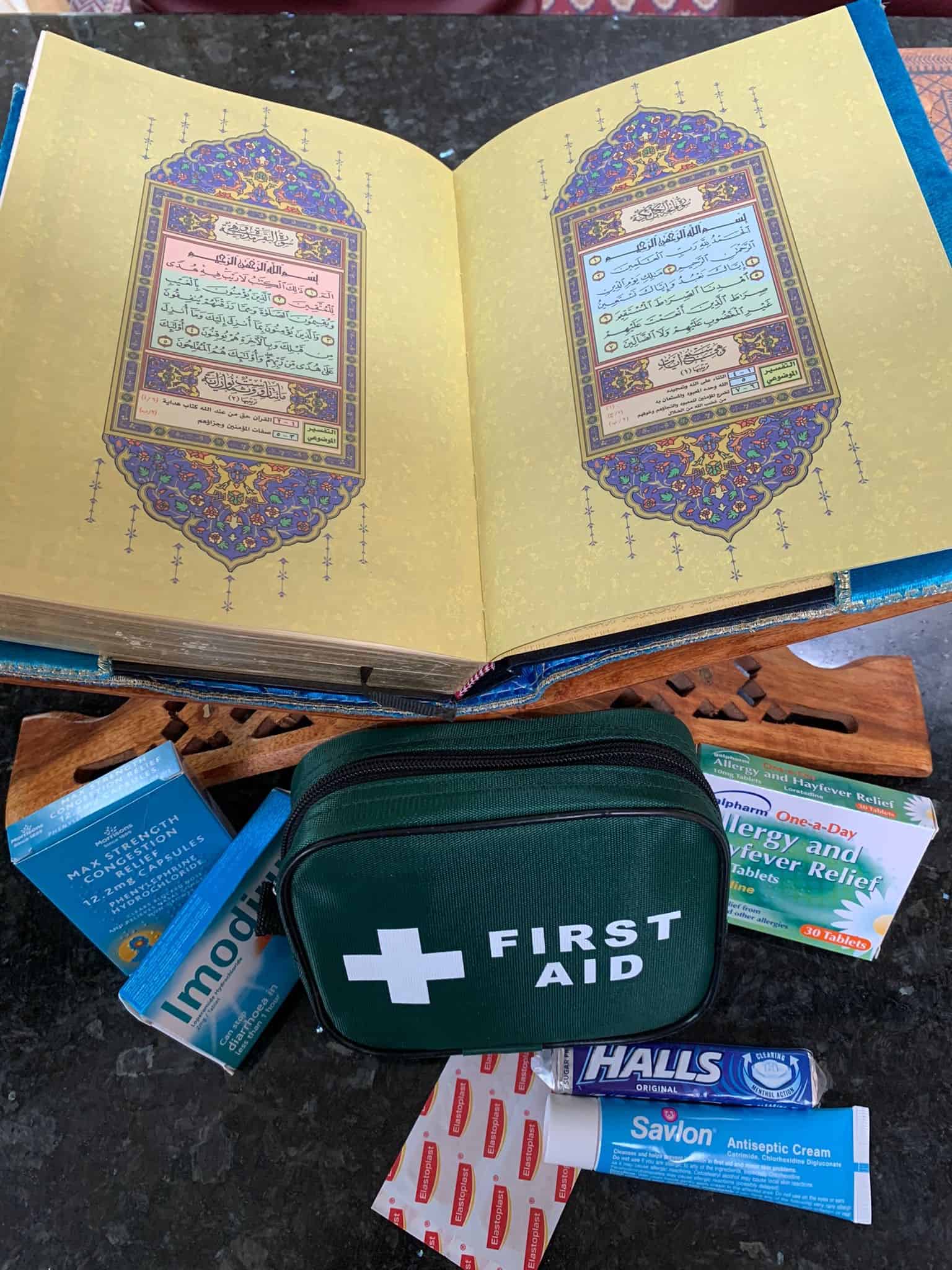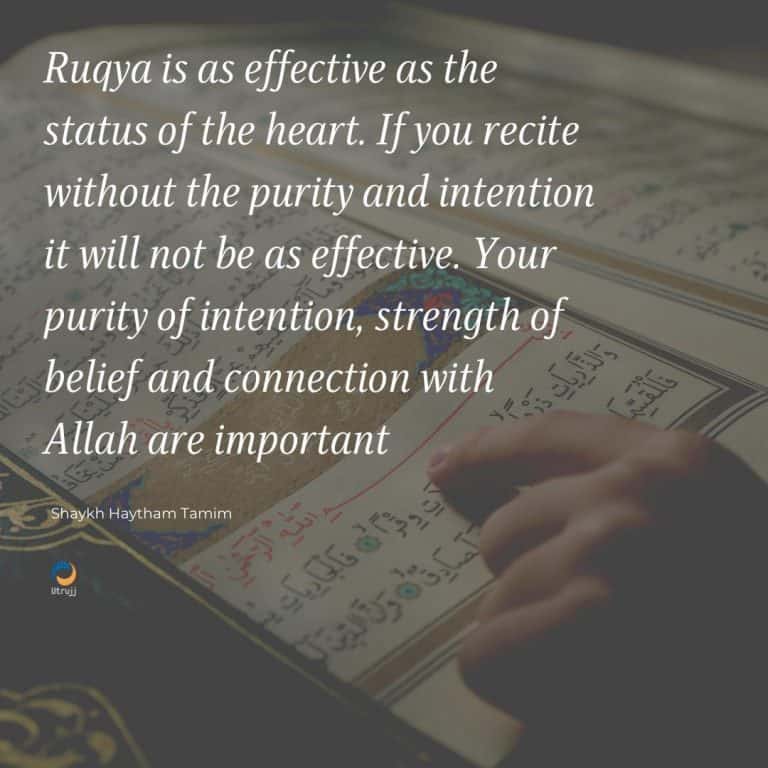Shifa – being healed by the Quran

Verses of healing
Among the verses in Surah Fussilat, Allah Almighty describes the Quran, ‘It is a guidance and a healing for those who believe.’ [41:44]
Allah is saying that the Quran is a book of guidance for the heart and mind, as well as a book of shifa – healing and cure. Scholars have collected six verses from the Quran that have the word shifa, which they call the Verses of Shifa.
If you have any ailments – any headaches or pains – you should recite Surat al-Fatiha, Ayat al-Kursi, the three quls, and these Verses of Shifa. And all together this is the Ruqya ash-Sharia. But in order to benefit from these verses, you need to believe that the Quran is shifa. Allah says,
‘We send down the Quran as a healing and mercy for the believers’ [17:82]
I am not suggesting that you don’t go to the GP or the hospital if required, but you need imaan, belief, before you can get shifa. If you are reciting all these things just for recitation, even just for the barakah, you won’t get the shifa.

The story of Abu Sa’eed al-Khudri
There is a story of Abu Sa’eed al-Khudri, who was one of the companions of the Prophet (peace be on him). Abu Sa’eed was part of a group of travellers, and they came across a tribe of disbelievers, who refused to host them. This is against Arabic tradition: regardless of whether you know someone, or you are against them, you still need to host them as your guests.
After a while this tribe came to the travellers and said that their leader had been ill for some time, and asked if they had anyone who could perform ruqya. (Ruqya was well-known even before Islam, but they had their own non-Islamic recitations they used to use.) Abu Sa’eed al-Khudri said yes, but on one condition – since they hadn’t hosted them, they had to compensate them, and he asked them for some sheep.
Abu Sa’eed went and recited Surat al-Fatihah onto the leader, and he was healed. So they took the sheep, and they argued all the way back whether these sheep were halal or haram, and whether they could eat them.
We are familiar with this scenario of two sides arguing whether something is halal or haram – we have it in our mosques, always fighting. They used to have the same thing. When the companions reached back, they went to ask Rasul Allah (peace be on him), who accepted that the sheep were a legitimate reward for performing ruqyah. He also asked how Abu Sa’eed had known that al-Fatiha is ruqya!
Abu Sa`id (may Allah be pleased with him) said:
A group of the companions of Allah’s Messenger (ﷺ) proceeded on a journey till they dismounted near one of the Arab tribes and requested them to entertain them as their guests, but they (the tribe people) refused to entertain them. Then the chief of that tribe was bitten by a snake (or stung by a scorpion) and he was given all sorts of treatment, but all in vain. Some of them said, “Will you go to the group (those travelers) who have dismounted near you and see if one of them has something useful?” They came to them and said, “O the group! Our leader has been bitten by a snake (or stung by a scorpion) and we have treated him with everything but nothing benefited him Has anyone of you anything useful?” One of them replied, “Yes, by Allah, I know how to treat with a Ruqya. But. by Allah, we wanted you to receive us as your guests but you refused. I will not treat your patient with a Ruqya till you fix for us something as wages.” Consequently they agreed to give those travellers a flock of sheep. The man went with them (the people of the tribe) and started spitting (on the bite) and reciting Surat-al-Fatiha till the patient was healed and started walking as if he had not been sick. When the tribe people paid them their wages they had agreed upon, some of them (the Prophet’s companions) said, “Distribute (the sheep).” But the one who treated with the Ruqya said, “Do not do that till we go to Allah’s Apostle and mention to him what has happened, and see what he will order us.” So they came to Allah’s Messenger (ﷺ) and mentioned the story to him and he said, “How do you know that Surat-al-Fatiha is a Ruqya? You have done the right thing. Divide (what you have got) and assign for me a share with you.” [Bukhari]
In the narration of Musnad Ahmad, Abu Sa’id said replied to the question of the Messenger of Allah (peace be upon him) how he knew that Fatiha is Ruqya and Abu Said replied:
I have been inspired that. [Musnad Ahmad]
You have to believe in the healing
We all recite Fatiha 17 times a day every day, but we don’t know that it is ruqya. It has to come with strong belief, otherwise it’s just like pressing a button and having a reciter doing a recitation. Therefore we have to recite with the heart before we can get the healing.
Allah has promised healing for people, and in this ayah which we recited, He says ‘guidance and shifa’, so both things – physical and spiritual. Body and soul. Both will be cured by the Quran.
We need to activate the heart in order to get the benefit of the Quran and relieve stress. I can tell you hundreds of stories on the effect of ruqya – proper ruqya, not fake or superficial, or commercialised ruqya that some people advertise. I’m talking about the real ruqya, which comes from a sound heart. So let’s activate the cure of the Quran in our mind, with a sound heart with a deep belief. Ameen.
Shaykh Haytham Tamim – Ramadan Night 10
Transcribed by Hana Khan
Related posts
Can you perform long distance ruqya?
Mechanisms for coping with stress
- Why should you follow up one good action with another one?
- Don’t be a Ramadani person – Be a Rabbani person.
- How do you pray Salat al-Kusuf – the prayer during a solar eclipse
- The test of will – Tarawih Reflections 30
- Why humans can’t be gods – Tarawih reflections 29
How to turn an ordinary fast, into a super fast
What is the connection between closeness to Allah, excellence and fasting?
- Why should you follow up one good action with another one?
- Don’t be a Ramadani person – Be a Rabbani person.
- How do you pray Salat al-Kusuf – the prayer during a solar eclipse
- The test of will – Tarawih Reflections 30
- Why humans can’t be gods – Tarawih reflections 29

Recommended Posts

Don’t be a Ramadani person – Be a Rabbani person.
April 10, 2024

The test of will – Tarawih Reflections 30
April 09, 2024

